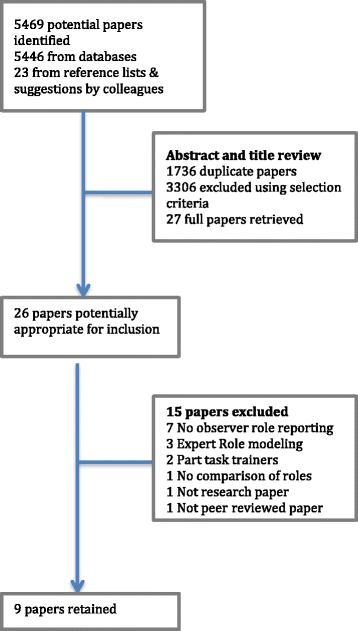Observer roles that optimise learning in healthcare simulation education: a systematic review
- PMID: 29449973
- PMCID: PMC5796608
- DOI: 10.1186/s41077-015-0004-8
Observer roles that optimise learning in healthcare simulation education: a systematic review
Abstract
Background: Simulation is widely used in health professional education. The convention that learners are actively involved may limit access to this educational method. The aim of this paper is to review the evidence for learning methods that employ directed observation as an alternative to hands-on participation in scenario-based simulation training. We sought studies that included either direct comparison of the learning outcomes of observers with those of active participants or identified factors important for the engagement of observers in simulation. We systematically searched health and education databases and reviewed journals and bibliographies for studies investigating or referring to observer roles in simulation using mannequins, simulated patients or role play simulations. A quality framework was used to rate the studies.
Methods: We sought studies that included either direct comparison of the learning outcomes of observers with those of active participants or identified factors important for the engagement of observers in simulation. We systematically searched health and education databases and reviewed journals and bibliographies for studies investigating or referring to observer roles in simulation using mannequins, simulated patients or role play simulations. A quality framework was used to rate the studies.
Results: Nine studies met the inclusion criteria. Five studies suggest learning outcomes in observer roles are as good or better than hands-on roles in simulation. Four studies document learner satisfaction in observer roles. Five studies used a tool to guide observers. Eight studies involved observers in the debrief. Learning and satisfaction in observer roles is closely associated with observer tools, learner engagement, role clarity and contribution to the debrief. Learners that valued observer roles described them as affording an overarching view, examination of details from a distance, and meaningful feedback during the debrief. Learners who did not value observer roles described them as passive, or boring when compared to hands-on engagement in the simulation encounter.
Conclusions: Learning outcomes and role satisfaction for observers is improved through learner engagement and the use of observer tools. The value that students attach to observer roles appear contingent on role clarity, use of observer tools, and inclusion of observers' perspectives in the debrief.
Keywords: Directed observer; Observer; Observer role; Simulation; Vicarious learning.
Figures
Similar articles
-
'It is a different type of learning'. A survey-based study on how simulation educators see and construct observer roles.BMJ Simul Technol Enhanc Learn. 2020 Sep 4;7(4):230-238. doi: 10.1136/bmjstel-2020-000634. eCollection 2021. BMJ Simul Technol Enhanc Learn. 2020. PMID: 35516821 Free PMC article.
-
A Mixed-methods Comparison of Participant and Observer Learner Roles in Simulation Education.AEM Educ Train. 2018 Dec 21;3(1):20-32. doi: 10.1002/aet2.10310. eCollection 2019 Jan. AEM Educ Train. 2018. PMID: 30680344 Free PMC article.
-
Exploring learning effectiveness for participant roles during healthcare simulation.Nurse Educ Today. 2022 Dec;119:105561. doi: 10.1016/j.nedt.2022.105561. Epub 2022 Sep 20. Nurse Educ Today. 2022. PMID: 36174280 Clinical Trial.
-
Engagement: what is it good for? The role of learner engagement in healthcare simulation contexts.Adv Health Sci Educ Theory Pract. 2019 Oct;24(4):811-825. doi: 10.1007/s10459-018-9865-7. Epub 2018 Nov 19. Adv Health Sci Educ Theory Pract. 2019. PMID: 30456474 Review.
-
The impact of moulage on learners' experience in simulation-based education and training: systematic review.BMC Med Educ. 2024 Jan 3;24(1):6. doi: 10.1186/s12909-023-04976-w. BMC Med Educ. 2024. PMID: 38172859 Free PMC article.
Cited by
-
Exploring the Impact of a Vicarious Learning Approach on Student Pharmacists' Professional Identity Formation Using a Simulated Pharmacist-Patient Encounter.Pharmacy (Basel). 2023 Nov 16;11(6):177. doi: 10.3390/pharmacy11060177. Pharmacy (Basel). 2023. PMID: 37987387 Free PMC article.
-
Listening and using participant and observer perspectives following large group, team-based simulations: empowering many voices.BMJ Simul Technol Enhanc Learn. 2020 Nov 1;6(6):374-375. doi: 10.1136/bmjstel-2020-000598. eCollection 2020. BMJ Simul Technol Enhanc Learn. 2020. PMID: 35515487 Free PMC article. No abstract available.
-
Beyond reliability: assessing rater competence when using a behavioural marker system.Adv Simul (Lond). 2024 Dec 31;9(1):55. doi: 10.1186/s41077-024-00329-9. Adv Simul (Lond). 2024. PMID: 39736776 Free PMC article.
-
Transforming National League for Nursing Advancing Care Excellence for Seniors Unfolding Cases into Virtual Simulations: An Innovative Approach for Interactive Learning.Clin Simul Nurs. 2022 Nov;72:37-42. doi: 10.1016/j.ecns.2021.09.003. Epub 2021 Nov 21. Clin Simul Nurs. 2022. PMID: 36317065 Free PMC article.
-
Alice's Delirium: A Theatre-based Simulation Scenario for Nursing.Cureus. 2018 Apr 2;10(4):e2411. doi: 10.7759/cureus.2411. Cureus. 2018. PMID: 29872592 Free PMC article.
References
-
- Hayden JK, Smiley RA, Alexander M, Kardong-Edgren S, Jeffries PR. The NCSBN National Simulation Study: a longitudinal, randomized, controlled study replacing clinical hours with simulation in prelicensure nursing education. J Nur Reg. 2014;5(S2):s4–s41.
LinkOut - more resources
Full Text Sources
Other Literature Sources
Miscellaneous


